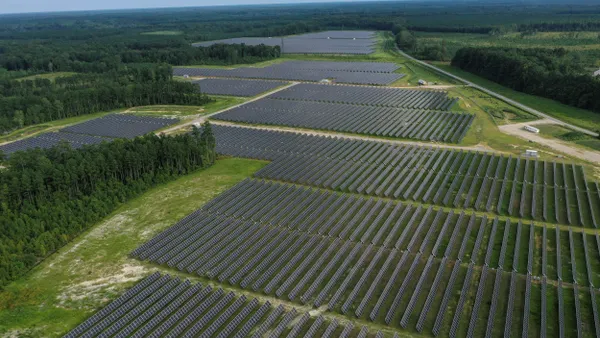Dive Brief:
- An extension of the solar investment tax credit would be a boon to the domestic industry, bolstering installations by 54% through 2020 and creating a 20 GW annual solar market, according to new analysis from GTM Research.
- The firm released its estimate amid news reports that Congress could vote today on a five-year extension of the credit, which is currently slated to drop from 30% to 10% at the end of 2016.
- News of a possible extension sent solar stocks north, with SunPower rising more than 14% yesterday and SunEdison shares up more than 25%. SolarCity shares were up a whopping 34%.
Dive Insight:
It's been a good week if you owned stock in domestic solar companies, as word has leaked out that Congress is considering an extension of the investment tax credit. Shares closed markedly higher for publicly-traded solar companies, and GTM Research is now predicting a significant boost in installations should the news prove true.
"The ITC extension currently written into the omnibus spending bill will result in a 20 gigawatt annual solar market in the U.S. by 2020," Shayle Kann, a senior vice president at GTM Research, said in a statement. "At that rate, more solar will be installed each year than was added to the grid cumulatively through 2014."
GTM believes an ITC extension would foster $40 billion in incremental investment in solar between 2016 and 2020. And the firm said the impact would be most significant in the utility sector: An ITC extension would increase utility-scale deployments 73% through 2020.
“Given price trends in the utility solar sector, the five-year ITC extension will likely result in utility-scale solar contracts being signed for less than $0.04/kWh regularly over the next two years,” said Cory Honeyman, senior analyst at GTM Research.
In the distributed solar market, GTM said residential installations will see a 35% boost, while commercial solar will increase by 51% over a non-extension scenario.
If the bill is passed without changes, the credit would remain at 30% through 2019, then declining to 26% in 2020, 22% in 2021, and finally to 10% for non-residential and third-party owned residential systems, and 0% for host-owned residential. The bill also includes a “commence construction” provision, allowing projects to come on-line by the end of 2023 and still qualify for larger credits.
Democrats extracted the extension in both solar and wind tax credits in exchange for not opposing Republican efforts to lift the 40-year-old ban on U.S. oil exports. Votes on the tax extenders bill and a $1.1 trillion government funding bill are expected by the end of the week.














